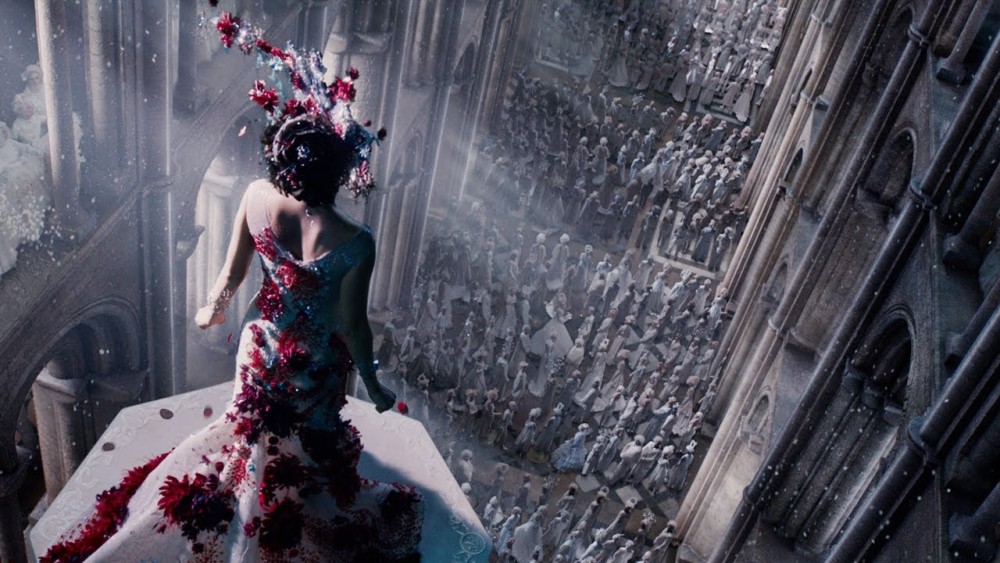
The names Lana and Lilly Wachowski don’t inspire much hope in audiences and critics these days, and that’s something that gives me no pleasure considering their ambition remains unchecked after multiple box office failures. Each of their films proves to be just as out there, just as determined to present something potentially familiar in a new and interesting way as the last. That’s not something most can claim, and Jupiter Ascending – their original space opera cobbled together from every other fairy tale one can imagine – only strengthens that.
Opening in a very Cinderella fashion, with Mila Kunis’ Jupiter Jones cleaning toilets for a living and dealing with a rather colorful family after tragic parental back story is presented, Jupiter Ascending has no shame in hiding its fairy tale inspirations. At one point in the film, long after Jupiter is rescued from an alien plot to capture her by the wolf-human hybrid Caine (Channing Tatum), a character literally refers to the pair as, “Beauty and her beast.” There’s little to no subtlety at play here, but in a film quite as grandiose in scale as this one, is there any need for it?
So turns out Jupiter is essentially the reincarnation of a space queen with three children, all of whom are at each other’s throats (in one case literally) in the quest to possess Earth – and quite a collection of other planets – for themselves. To think a whole film could be loosely framed around the bureaucracy that comes will executing a will is pretty hilarious, especially when the bickering over possessions lasts thousands of years. The Wachowski siblings even toss in a direct nod to Terry Gilliam’s brand of off-beat filmmaking with an entire planet dedicated to the never-ending loop of bureaucracy, and it’s not the only world they present on screen with its own distinct style.
Every single thing about Jupiter Ascending‘s universe feels lived-in because of their immense dedication to world-building on screen. For all the complaints of lack of originality in narrative – fair points considering how much they crib from fairy tale archetypes – the sheer ignorance of the beautiful history they pepper into almost every scene is disappointing. The often luxurious costumes, shots of Jupiter that look more like expressionist paintings than anything digital, Giacchino’s inspired and less-derivative-than-usual score, the make-up and special effects that contribute to all sorts of characters (androids, talking dino-guards, splices, and more!), and breathtaking sets that look straight out of a video game all create an expansive aesthetic almost entirely their own. But for all the beauty they present, so much of what’s underneath is simply about tying this space world to humanity. The Wachowskis tie the events of this familial conflict and prior to many of Earth’s events and cultural beats. Characters mention their influence upon the plague and dinosaur extinction, while the rest of the film shows how they’ve essentially created humanity’s perception of aliens, complete with little grey men, crop circles and memory wipes.
World-building is nothing without compelling characters though, even if the narrative bonds that tie them together aren’t the strongest. By no means can anyone deny the performance by Eddie Redmayne as the cape-wearing matricide-committing space ruler is anything but camp-tastic, but he and the other children of Jupiter exist outside the realm of reality, so the performance is fitting. Sometimes devoid of emotion and sometimes full of it, the three nicely mirror the way that thousands upon thousands of years can change a human; vanity, desperation, manipulation, and pride running rampant.
It’s in Jupiter that the audience finds their true link to humanity, through the “princess” character everyone has come to be familiar with. As such, she occasionally falls into situations where she has to be rescued by her “prince”, and while that has certainly sparked up complaints and discussion about her role as a heroine, she possesses something entirely more important to a leading lady than falling into the “strong female character” stock type that solely involves ass-kicking. In every moment of her screentime, Mila Kunis coveys just how strong of will and character Jupiter is. Sure, she’s got a romantic b-plot of prince/princess, one that feels as though scenes of romantic development are missing at times, but it’s so second fiddle to everything else going on.
Jupiter consistently takes the time to familiarize herself with a world completely outside of her narrow scope, and each time she’s thrust into danger, it’s because she’s a human – one whose spent her entire life cleaning houses as an immigrant – stuck in a world that she knows absolutely nothing about. Yes, she’s rescued (although more often than not, she only survives to be rescued by her own intuition and self-preservation), but it’s not weak to see a woman standing up for what she believes in even if it means death for her and those around her.
And Jupiter Ascending, as grandiose and stylish a space opera as it is, is just like it’s leading lady; interesting, full of unabashed honesty, sporting a great sense of humor, and truly dedicated to exploring each and every aspect of the new world she’s stepping into.
—
Directed by Lana Wachowski & Lilly Wachowski; written by Lana Wachowski & Lilly Wachowski; starring Mila Kunis, Channing Tatum, Eddie Redmayne, Douglas Booth, Tuppence Middleton, Sean Bean, Doona Bae, David Ajala, Gugu Mbatha-Raw & James D’Arcy; 127 minutes.
Jupiter Ascending is currently in theaters everywhere.



 Derek
Derek
 Isabelle
Isabelle